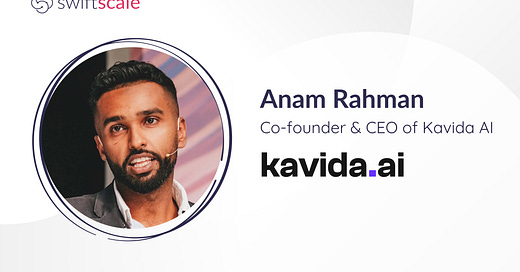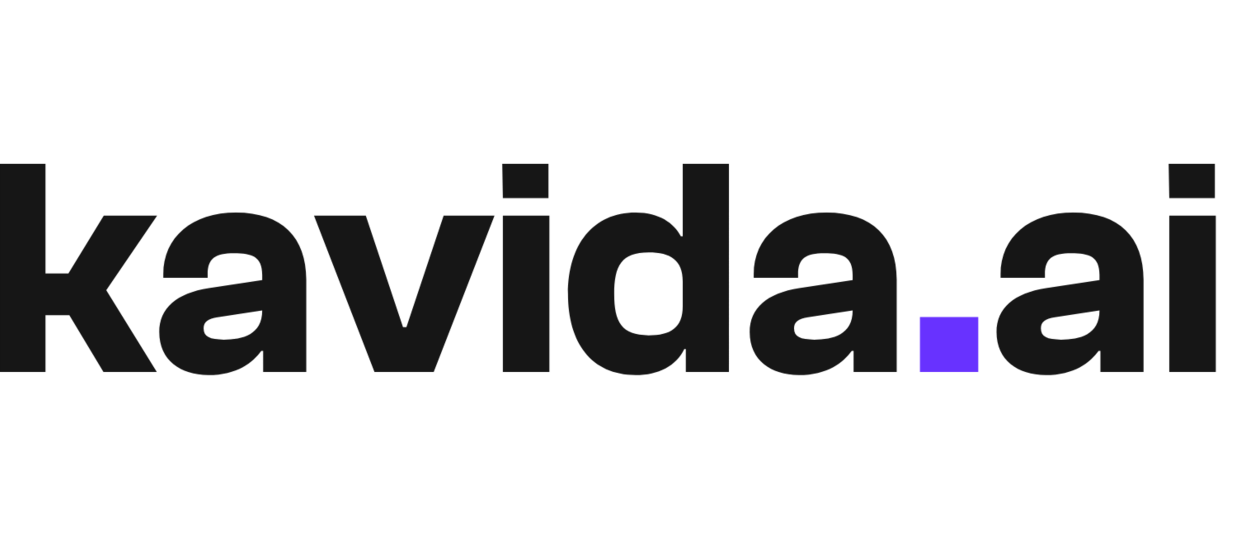Founder in Focus: Anam Rahman, Kavida AI
We sit down with Anam Rahman, founder of Kavida AI to find out why he’s obsessed with solving supply chain issues, what shocked him about US vs. UK sales and why every great founder is a survivor.
Global trade has entered into a new era of instability. Supply chain disruptions are routine, with on-time deliveries falling from 90% (pre-pandemic) to 75%. Procurement teams are ill-equipped and overwhelmed - they still rely on email chains, excel sheets and manual searches to manage documentation, track orders, communicate with suppliers and identify supply chain risks.
There are 8.3m manufacturers globally (a total addressable market of $166Bn), and these delays have enormous ramifications - thanks to missing or late parts, manufacturers can now expect to lose 42% of one year's EBITDA every decade (McKinsey).
Kavida AI is here to solve this.
About Kavida AI:
Founded in: 2020
Employee count: 11-50
HQ: London, UK
Current funding stage: Pre-Seed
Total funding to date: £1.2 million
Kavida AI are creating a new category of procurement software called "post-order management," which sits between ERP systems (like SAP) and Warehouse Management Systems (like Epicor), to automate procurement workflows and ensure the timely arrival of parts and materials for manufacturers.
It does this with “Agent PO”a natural language co-pilot that intelligently coordinates with suppliers via their preferred communication channel (ie. email). The supplier information is then bundled with document management, shipment tracking, risk management and supplier communications into a single, easy-to-use system that provides complete visibility and control of every order, shipment and risk to give procurement teams peace of mind.
Interview
We always start by asking founders or operators “why this?”, “why now?” and “why you?” Answers to these questions peel back the lid on what makes founders tick, why their solution will succeed and ultimately, why you should care.
Why now?
The breakthroughs we've had in AI over the last two years have enabled us to do things that were previously impossible. The ability to automate has just reached a new level and a new paradigm. I think every role that has a level of repetitiveness will be automated because of language models.
In supply chains, there isn't a good level of collaboration with suppliers. Because of the breakthroughs in language models, we’ve been able to build a tool where people can automate communication with suppliers and message them directly within their email. It means recipients don’t know that they're not dealing with the actual person. The email is coming from their inbox and you're able to understand the context of what's being said, what needs to be done and the key action items. It means that there's no change in the workflow and the problem actually gets solved.
Also, supply chains have never been more volatile. We've seen this with issues going on from the Suez Canal, Russia, Ukraine, and the Middle East. The world has never been more volatile and the need to automate and digitise those processes has never been higher.
Why this?
The problem is as simple as a messy inbox that contains thousands of orders. Just like all of our inboxes, you miss critical things, which leads to delays and changes to dates. This means you then have to take that data out and put it into an Excel and give it to colleagues.
When parts are missed or there's a miscommunication in bringing them in on time, the costs are catastrophic. McKinsey found that 42% of one year's profit is lost every ten years due to supply chain disruptions. Procurement needs to coordinate with suppliers for tens of thousands of parts and moving pieces. Every downstream department like finance, warehousing, sales, customer service, and production depends on this upstream function working.
So, when there are disruptions here, everybody feels the impact. You get catastrophic costs that impact everyone. The whole efficiency of the organisation just goes through the floor.
Why you?
If I'm honest with you, I don't think there's anything special about me. It's my co-founder, Sumit. Sumit studied industrial systems engineering at the Indian Institute of Technology, Kharagpur, which is harder to get into than Harvard. That's the creme de la creme of India. He then received a fully funded PhD, by Jaguar Land Rover at Warwick University, to build AI agents in automotive manufacturing. He is extraordinary and he's engineered this solution into reality. His ability to understand supply chain problems is also just incredible. Myself? I just had a massive obsession with this problem just a couple of months before COVID and that took me down a rabbit hole to solve the problem.
My background is in digital transformation for the food and agriculture industry, where when you have disruptions to those supply chains people starve. So in the case of COVID, 250 million people were pushed to the brink of starvation because of predominantly supply chain problems. We just became obsessed with trying to solve that.
We've got an extraordinary team now at the highest level, we've just got two other multi-exited founders on the board, one of which built and sold a supply chain software company and one of which has sold three advertising tech companies. So, we're surrounded by all the right talent at the top and we've got a brilliant data science and engineering team that's been able to build this AI.
Is there anything that surprised you about working in this sector?
I was definitely surprised at how much more receptive they are in the US.
I mean, it's day and night.
It's the result of the macro environment in the US. The US has been booming for the last five years and everybody has more money. There's so much government money that's gone into bringing manufacturing closer to home. We've managed to pick up US customers without really trying and I was shocked at the state of UK industry. I'm absolutely jaw-dropped by this. It's been eight years now since Brexit has happened and UK industry has been in this constant state of wait-and-see, which has made selling AI solutions into the sector incredibly more difficult than it needs to be.
I was also pretty shocked that everybody we meet has the same problem, and they’re all trying to solve it in the same way. We've got garment manufacturing customers in Sri Lanka, automotive customers in Newcastle and pharmaceutical customers in the US, and they’re all using email and excel to manage their supply chains. It doesn't matter about the sector, the place in the world, they all do it in the same way. No wonder it’s such an issue. I think the size of the market, the size of the problem is way bigger than I had initially anticipated on day one.
What’s been the biggest challenge that you've had to overcome?
Product is the biggest challenge because it took us three and a half years to get to this point.
As a founder, you don't know when your inflexion point is. It seems like an airy-fairy fantasy that you can build such a great product, and then there are people lining up to buy it and it's just selling like hotcakes. But, it does happen. The only way that it happens is through constant iterations. I'm also making some big decisions when things really aren't working. Even though you might spend a lot of money and a lot of time to just be able to drop that and make a big change.
But, if you do enough iterations, if you change enough times, if you address a top of mind priority, you will build something that people desperately want and they'll pay for. So that R & D process takes years. It really takes years.
What factors have contributed most to your business’ success?
There are times where the business does go to the brink of collapse and you have to survive long enough. If you can do that, you'll figure it out.
The hardest part is survival.
That's one thing I would say. The ability to survive!
I think every great founder is a survivor. First, they buy themselves enough time, and then they figure it out. Being able to navigate those scenarios and challenges and having the help around you helps, and swiftscale played a massive role in that.
The second thing I would say is having speed. The speed at which we've executed on the new product has made me appreciate that it was our competitive advantage. The ability to do things fast, and get it done. That's why we're here, because it's going to take large corporations years before they release AI agents and apply LLMs as well as they could do.
The final contribution I would say is hiring for potential. Especially because you don’t have big budgets at the beginning. You're hiring for talent that can grow into becoming something extraordinary. We made the right decisions on finding those hidden or overlooked gems that everybody else missed. The team that we had in place to be able to execute and put all the pieces of the jigsaw together was a big part as well.
Which startup is inspiring you right now?
I really like what Emitwise are doing. I like that they’re taking their product into supply chains. This gives their clients the ability to make decisions with carbon emissions in mind much earlier in the design process. It could be a game changer for sustainability in the supply chain.
If you were starting out again, would there be any advice that you'd give to your younger self?
How much time do you have?! One piece of advice I would give is to raise enough so that you don't need to raise again. If you can build it, so you don't need to raise at all then you've done a great job and you've done a better job than somebody that did raise. The second thing is to iterate. Iterate fast. When you bring on great tech talent, you make the right decisions on the right iterations. What you're aiming for is a product that is so amazing, people see it and they love it and they want it right now. So don't stop iterating until you've got that. If you don't have it, keep iterating. Keep changing.
You know, you can go so far in the startup world without building a product. I mean, you can go really far. You can generate a huge waitlist, you can raise capital, you can have prepaid customers, you can go so far with just designs and before you've even written a line of code, and then the code that you do write is absolutely the right code because you've got all of this evidence. Definitely take that kind of approach on, because the code that you do write for any software, the first two, three years of writing that code is useless.
Because, if you've done your job properly, you're changing your product so many times that what you do right at the beginning and all that money you spend is useless in year three. Save yourself that headache!
Another big learning was that product-market fit is 80% product marketing and 20% product engineering.
Product marketing is the way that you describe your product and the way that your customers perceive it. You can make iterations to all of those things without spending a penny until you find out what works. An ultra-big focus on product marketing on day one will take you so far so quickly without spending anything.
Yeah, that's about it!
We matchmake founders, investors and executives and its the quality of our network that sets us apart.
Get in touch: hello@swiftscale.co






